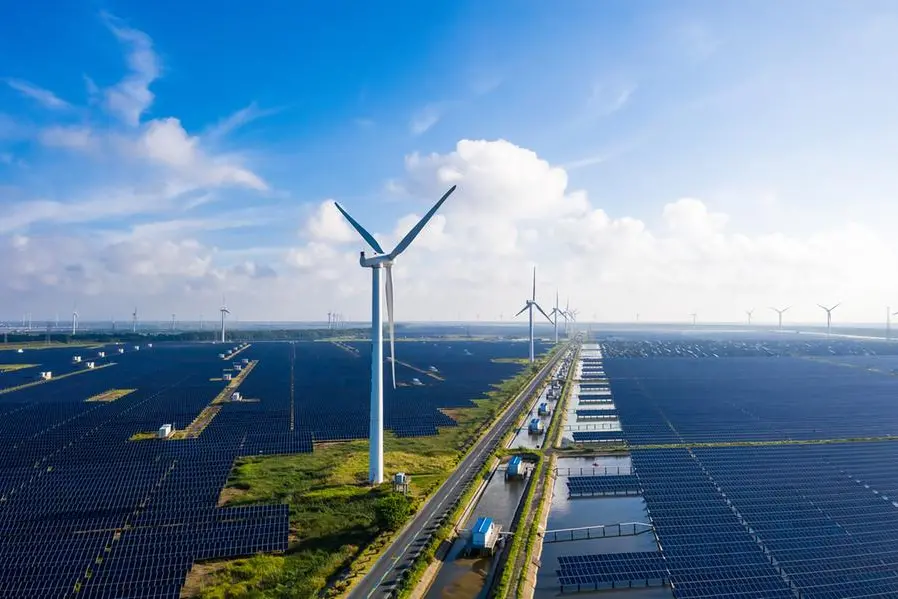PHOTO
The 800mw Al Kharsaah Solar Power Project, inaugurated last year, will enable Qatar reduce its Co2 emission significantly, the 3rd International Conference on Sustainable Energy-Water-Environment Nexus in Desert Climates (ICSEWEN'23) was told Monday.
“The country’s first large scale solar plant will, over its lifespan, enable Qatar reduce its Co2 emission by 26,000mn metric tonnes,” explained HE Dr Mohammed bin Saleh al-Sada, former Minister of State for Energy and Industry.
He was delivering the keynote address at the opening ceremony of ICSEWEN'23, organised by Hamad Bin Khalifa University's Qatar Environment and Energy Research Institute (Qeeri).
HE the Minister of Environment and Climate Change Sheikh Dr Faleh bin Nasser bin Ahmed bin Ali al-Thani, Qatar General Electricity and Water Corporation President Eng Essa bin Hilal al-Kuwari and HBKU president Dr Ahmed M Hasna were present on the occasion.
One of the key pillars of Qatar’s strategy is to diversify the energy mix and increase the share of renewable energy resources, HE Dr al-Sada pointed out.
“During the first year of operation, Al Kharsaah project was planned to generate almost 2mn megawatt hours-equivalent to the energy consumption of 55,000 households in Qatar. This project demonstrates Qatar’s commitment to sustainable energy development and contributes to the global sustainable energy aspect,” he explained.
“Another pillar of the strategy is to manage water resources efficiently. The iconic Water Security Mega Reservoirs project - one of the largest in the world-significantly extends Qatar’s water reserves,” he continued.
The former minister noted that the water, energy environment nexus in recent years has emerged as a holistic research management approach to analyse synergies.
“Water is essential for producing energy and food and energy are necessary for distributing water. Food production depends on an environment with clean water and sustainable energy resources. The nexus is closely associated with UN Sustainable goals such as zero hunger, clean water, sanitation, affordable clean energy and climate action,” he highlighted.
The official pointed out that the challenges in this nexus may vary from one region to the other. "These challenges are compounded in dessert climate such as Qatar and other GCC countries which depend on expensive and energy intensive desalination processes," he commented.
He expressed confidence that ICSEWEN'23 will help come up with recommendations and suggestions to meet the water, energy and environment challenges specifically in the region and globally at large.
“Water scarcity has always been a critical issue for Qatar like other states in the region. We have inadequate rainfall and depleting level of ground water and high cost of water desalination to meet most needs of the country. The abstraction of ground water in Qatar is another challenge,” added, the former minister.
© Gulf Times Newspaper 2022 Provided by SyndiGate Media Inc. (Syndigate.info).“The country’s first large scale solar plant will, over its lifespan, enable Qatar reduce its Co2 emission by 26,000mn metric tonnes,” explained HE Dr Mohammed bin Saleh al-Sada, former Minister of State for Energy and Industry.
He was delivering the keynote address at the opening ceremony of ICSEWEN'23, organised by Hamad Bin Khalifa University's Qatar Environment and Energy Research Institute (Qeeri).
HE the Minister of Environment and Climate Change Sheikh Dr Faleh bin Nasser bin Ahmed bin Ali al-Thani, Qatar General Electricity and Water Corporation President Eng Essa bin Hilal al-Kuwari and HBKU president Dr Ahmed M Hasna were present on the occasion.
One of the key pillars of Qatar’s strategy is to diversify the energy mix and increase the share of renewable energy resources, HE Dr al-Sada pointed out.
“During the first year of operation, Al Kharsaah project was planned to generate almost 2mn megawatt hours-equivalent to the energy consumption of 55,000 households in Qatar. This project demonstrates Qatar’s commitment to sustainable energy development and contributes to the global sustainable energy aspect,” he explained.
“Another pillar of the strategy is to manage water resources efficiently. The iconic Water Security Mega Reservoirs project - one of the largest in the world-significantly extends Qatar’s water reserves,” he continued.
The former minister noted that the water, energy environment nexus in recent years has emerged as a holistic research management approach to analyse synergies.
“Water is essential for producing energy and food and energy are necessary for distributing water. Food production depends on an environment with clean water and sustainable energy resources. The nexus is closely associated with UN Sustainable goals such as zero hunger, clean water, sanitation, affordable clean energy and climate action,” he highlighted.
The official pointed out that the challenges in this nexus may vary from one region to the other. "These challenges are compounded in dessert climate such as Qatar and other GCC countries which depend on expensive and energy intensive desalination processes," he commented.
He expressed confidence that ICSEWEN'23 will help come up with recommendations and suggestions to meet the water, energy and environment challenges specifically in the region and globally at large.
“Water scarcity has always been a critical issue for Qatar like other states in the region. We have inadequate rainfall and depleting level of ground water and high cost of water desalination to meet most needs of the country. The abstraction of ground water in Qatar is another challenge,” added, the former minister.





















